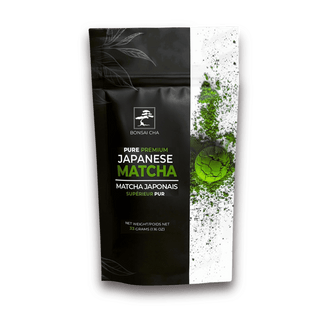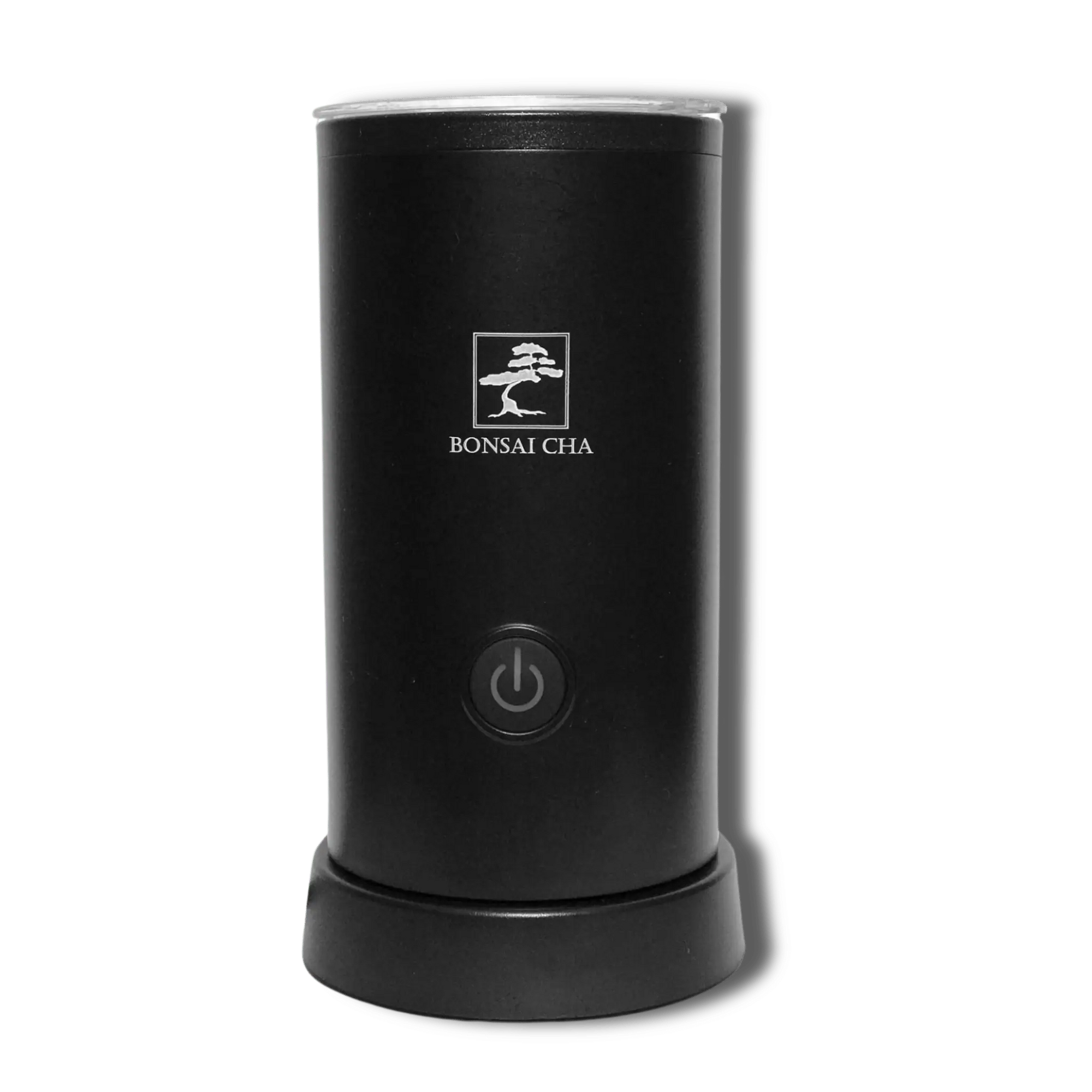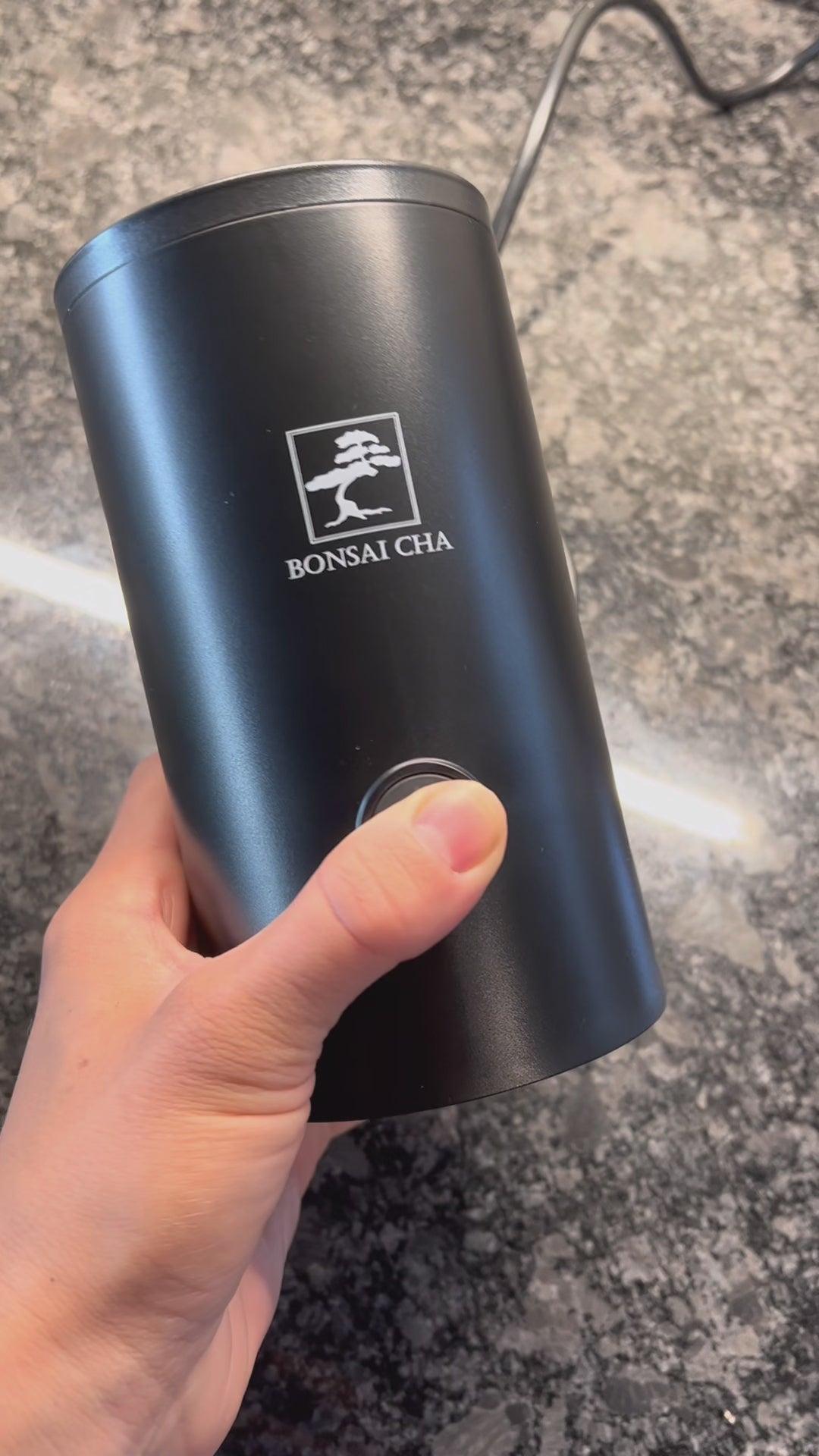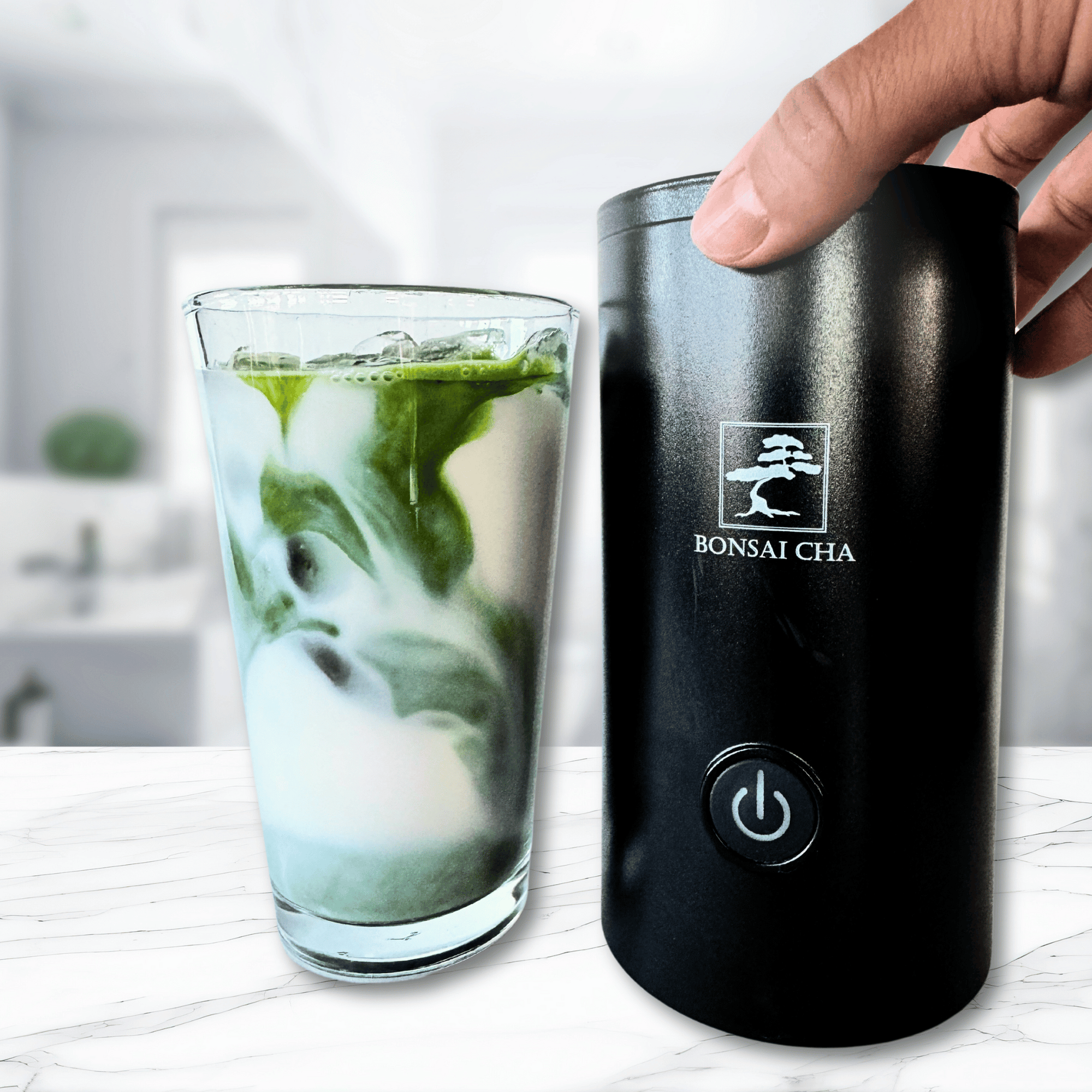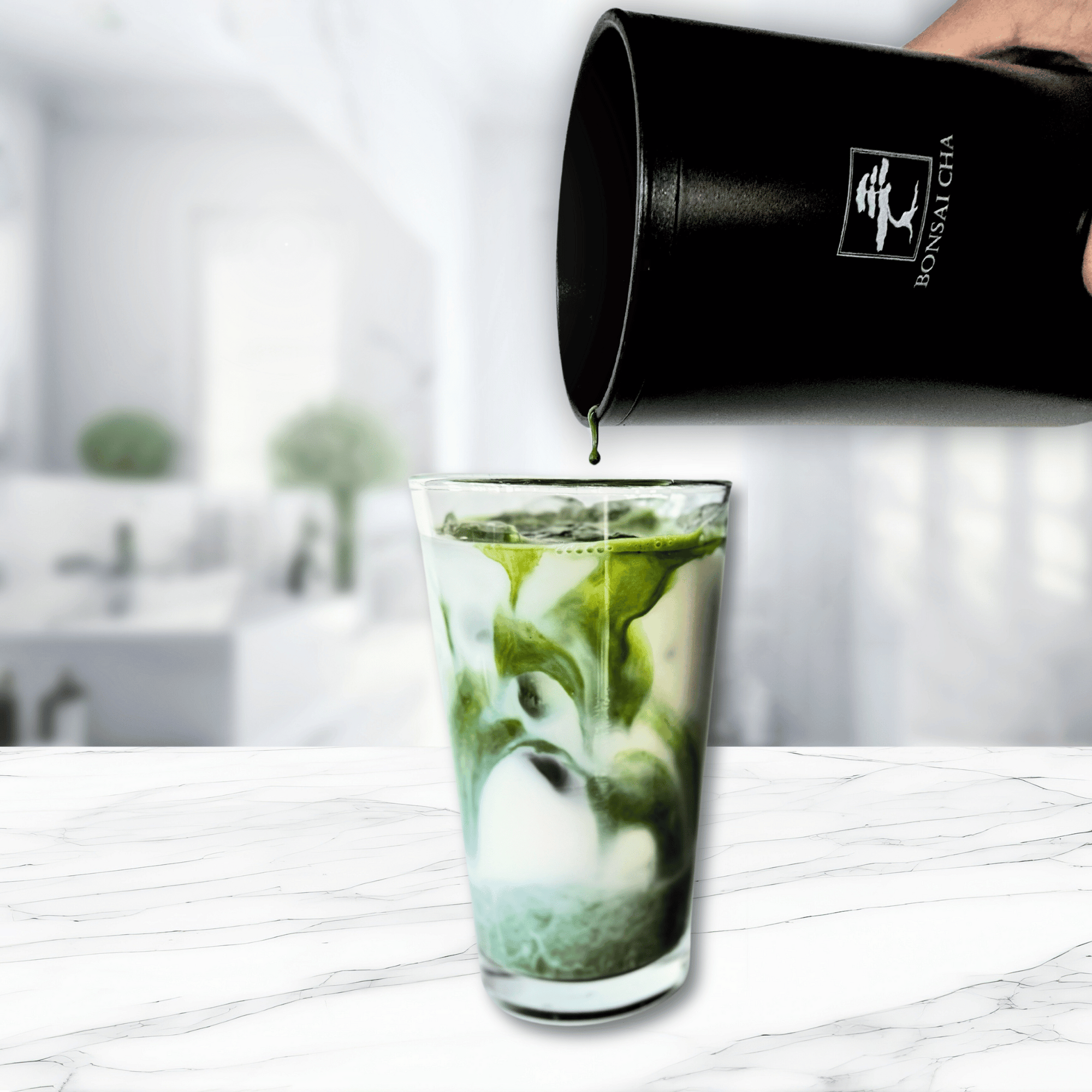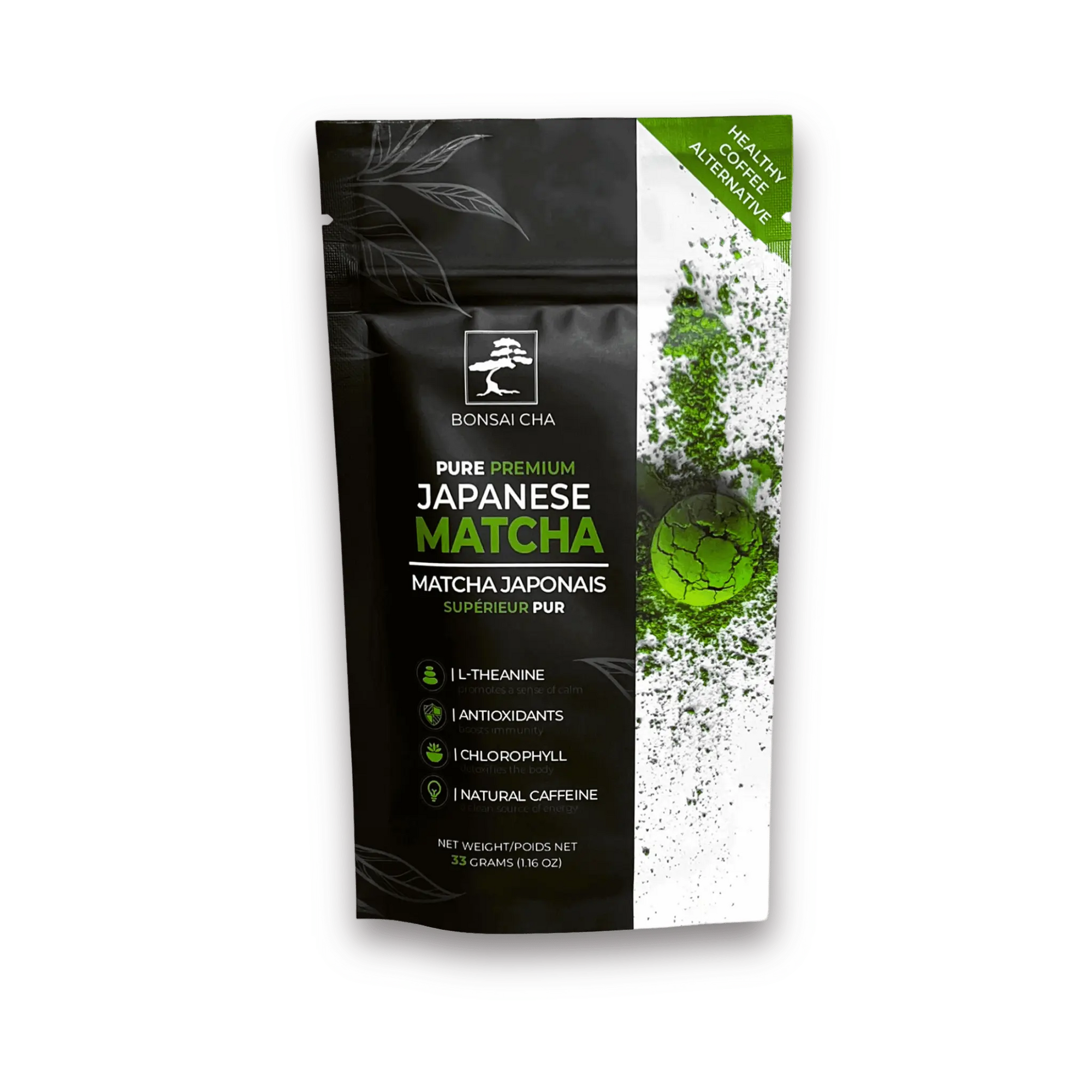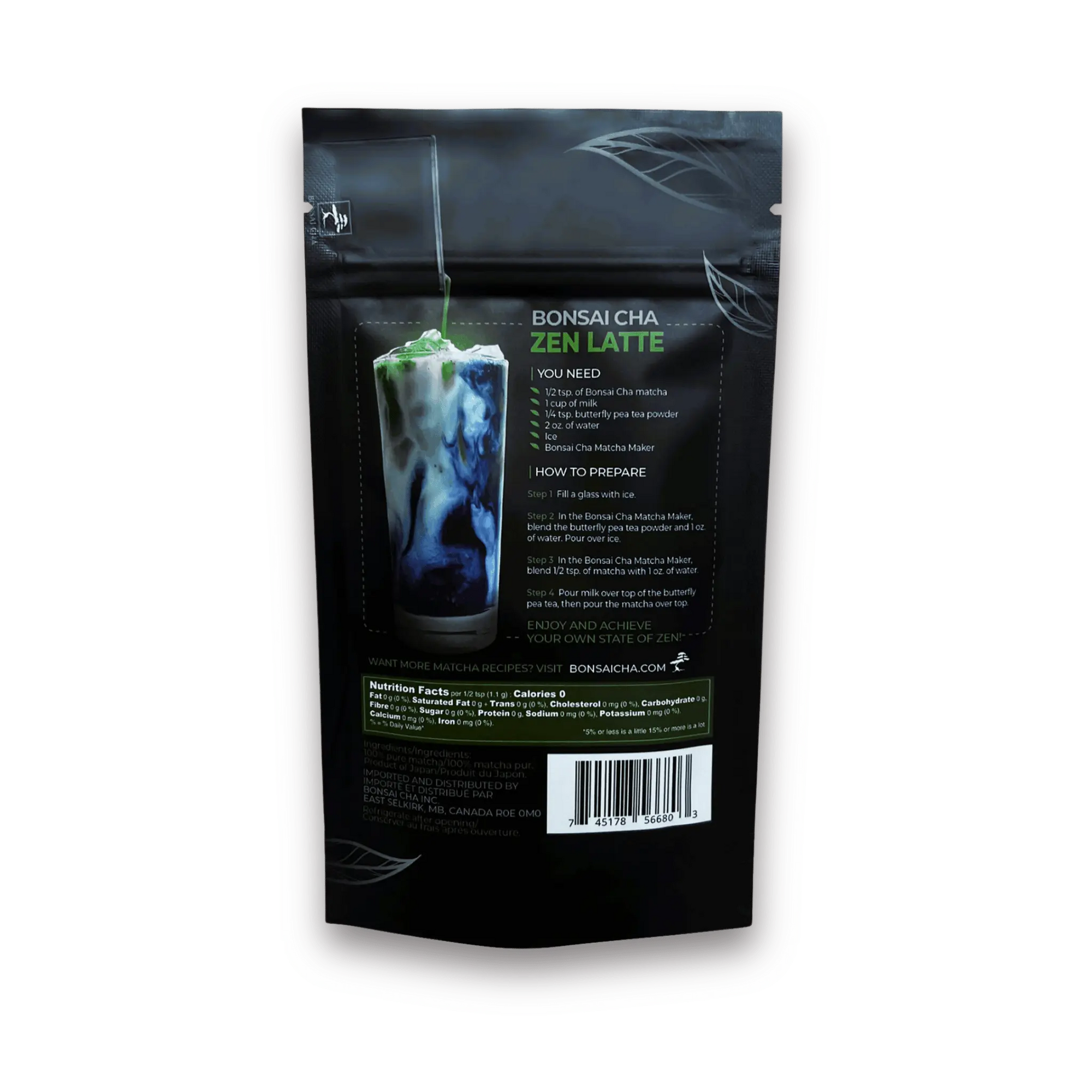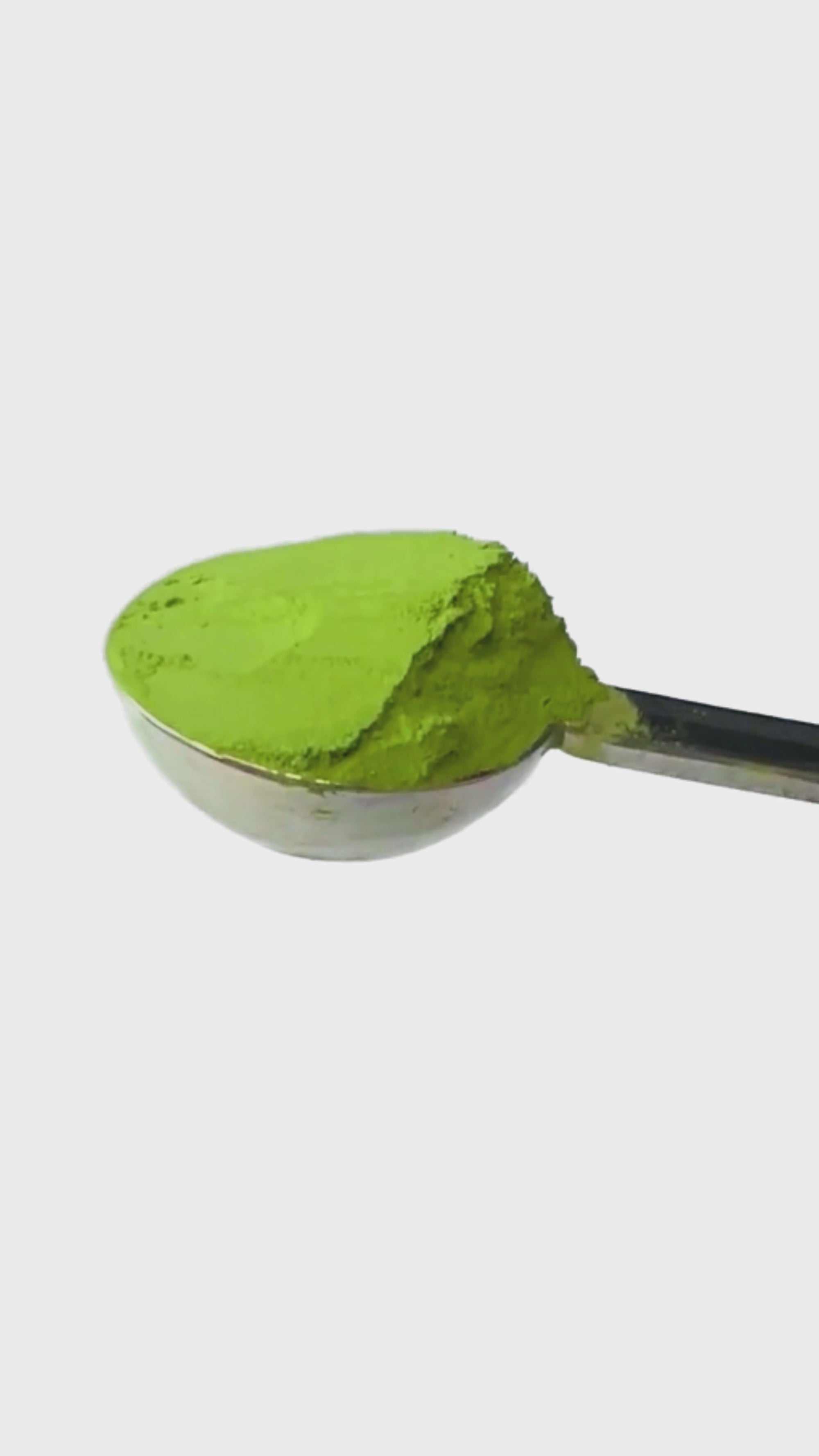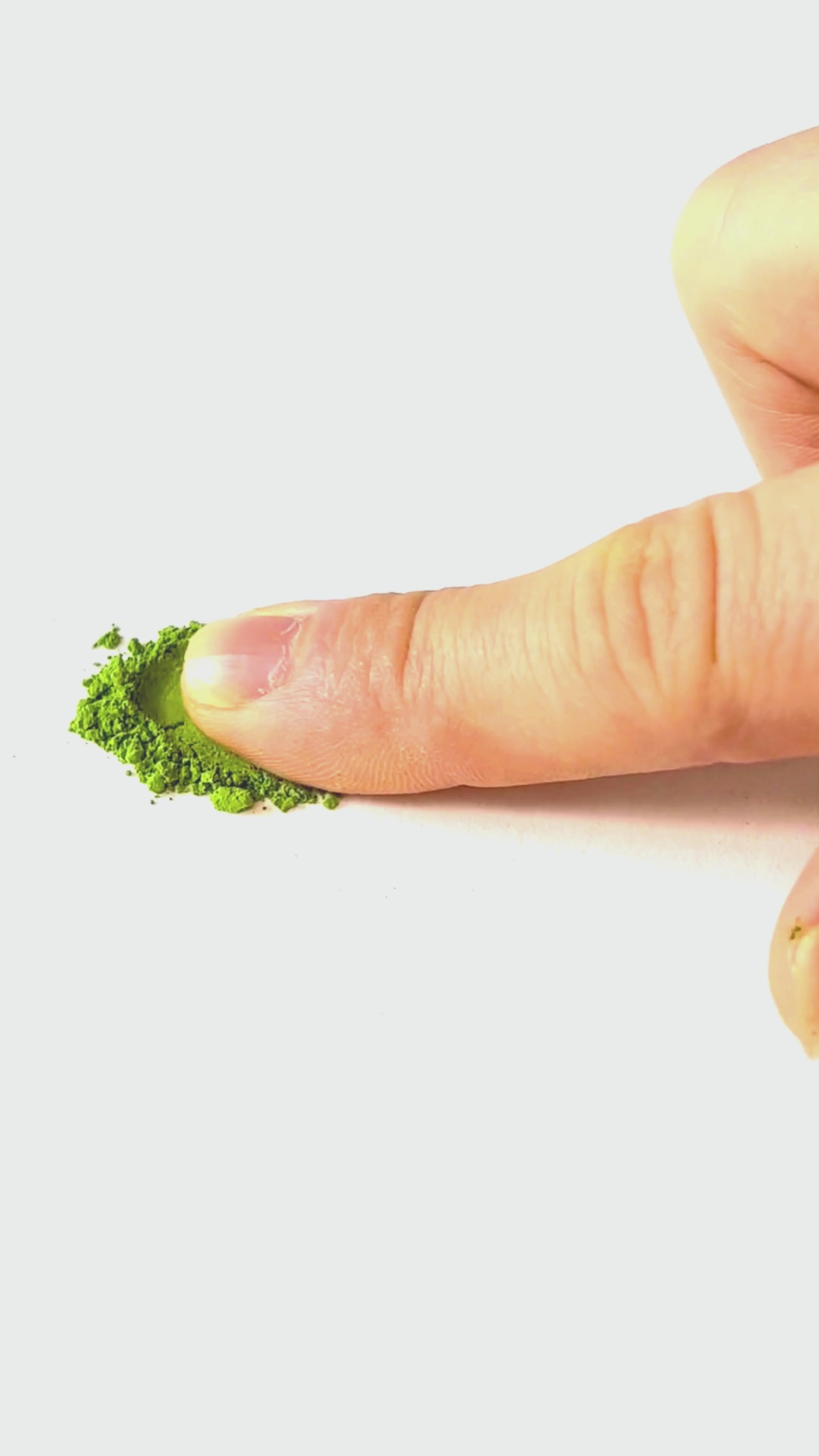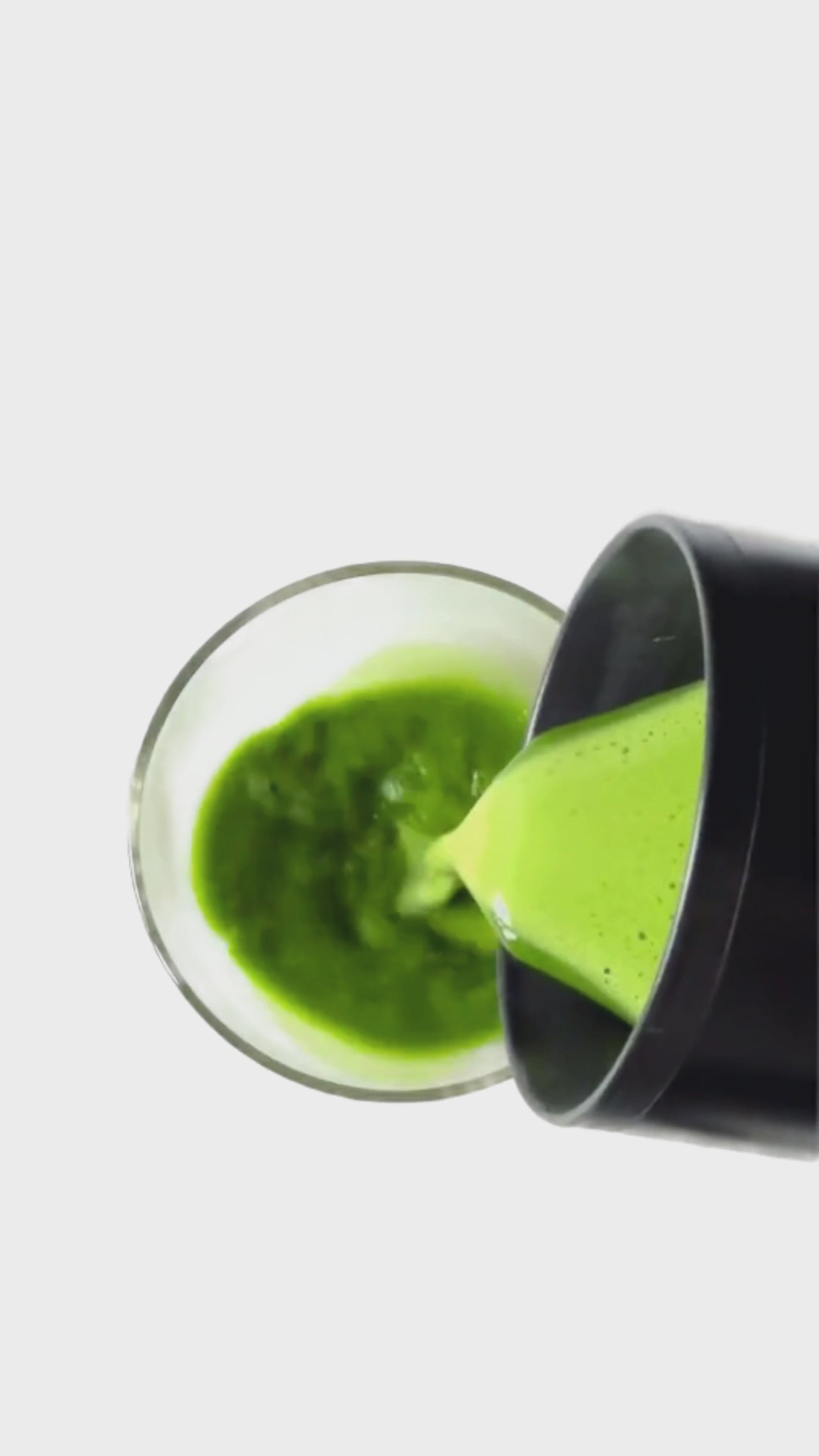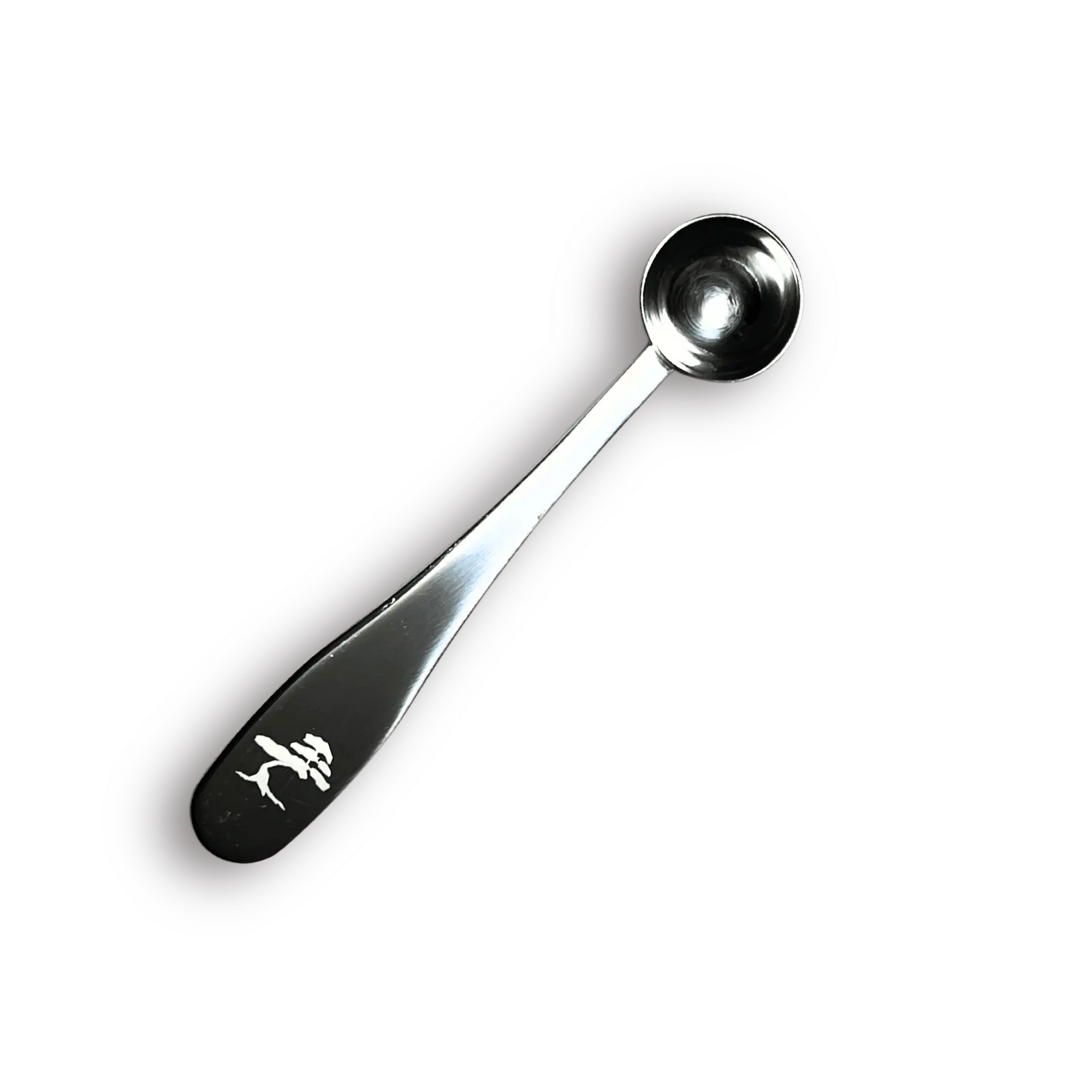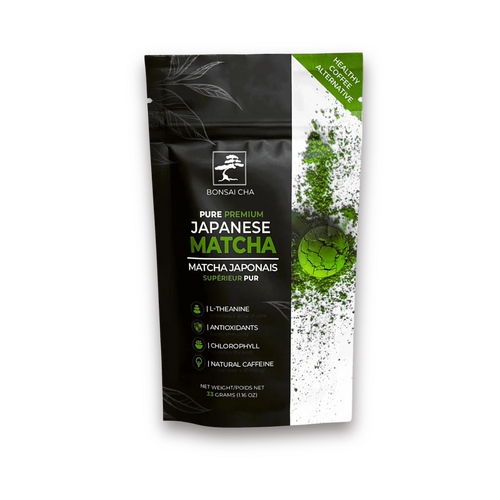How Much Caffeine is Really in Matcha Green Tea Powder? You’ll Be Surprised!
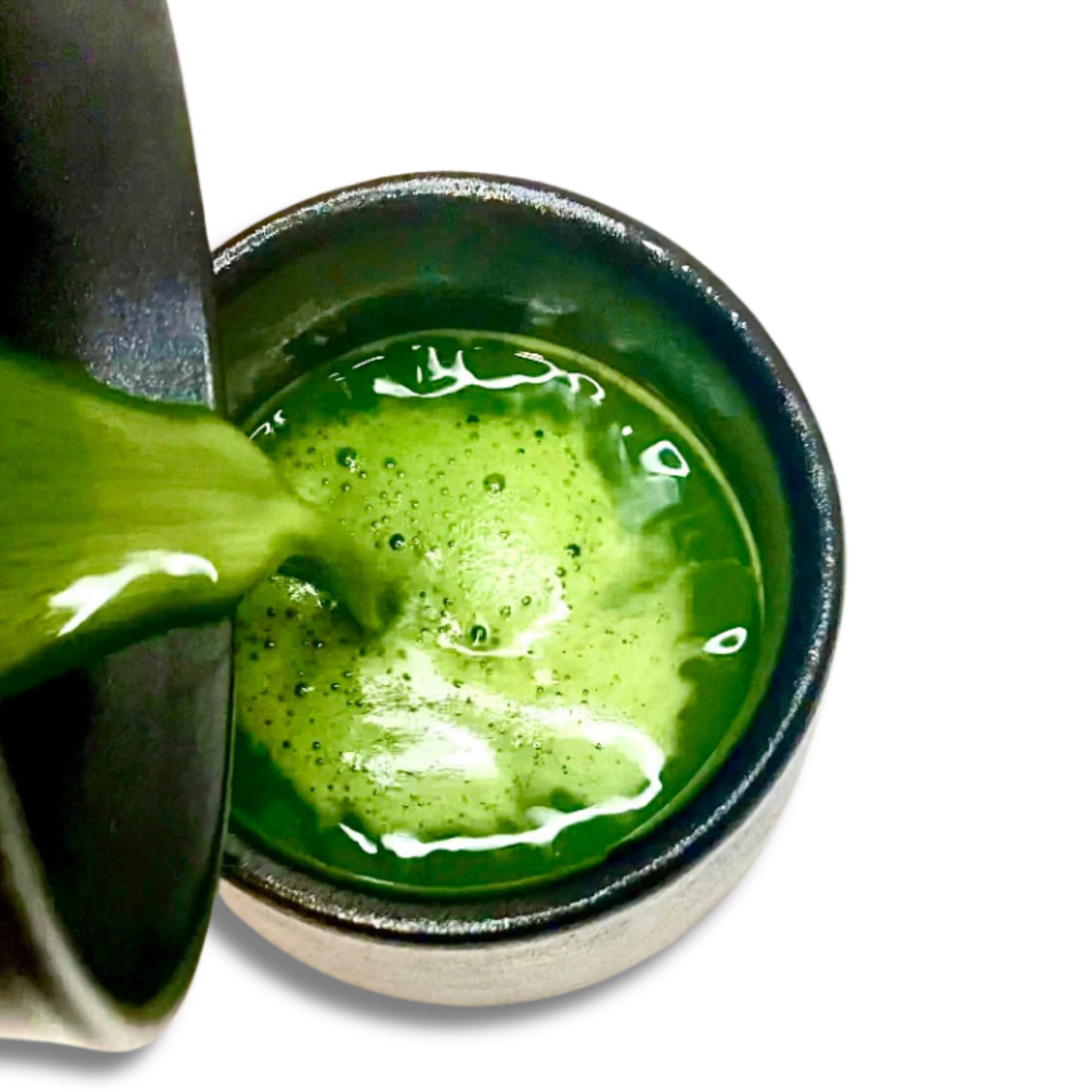
For those who love matcha, it’s more than just a trendy green drink—it’s a daily ritual that offers a host of health benefits.
But when it comes to caffeine, there’s a lot of curiosity around how matcha stacks up against other beverages like coffee and Earl Grey tea.
Whether you’re wondering how much caffeine is in matcha green tea powder or how it affects your energy levels and anxiety, this guide covers everything you need to know.
Key Takeaways:
- Caffeine Content: Matcha contains about 35 mg of caffeine per half teaspoon (1 gram) of powder, which is less than coffee but more than many other teas.
- Energy Levels: The combination of caffeine and L-theanine in matcha provides a steady energy boost without the jitters, making it ideal for those sensitive to caffeine.
- Anxiety: Matcha is often considered better than coffee for those with anxiety due to its calming effects from L-theanine.
- Longevity of Effects: The caffeine in matcha lasts longer and is released more steadily, reducing the chances of an energy crash.
- Daily Consumption: Drinking matcha every day is generally safe and can be part of a healthy lifestyle, but it’s best to consume it earlier in the day to avoid sleep disruptions.
Contents
Don't 'Cha Wanna Be in the Know?
Join our matcha community and be the first to receive insider tips, special offers and exclusive deals delivered to your inbox.
How Much Caffeine is in Matcha Green Tea?
Understanding the caffeine content in matcha is essential, especially if you're trying to manage your energy levels or reduce your caffeine intake. Unlike regular green tea, which is steeped, matcha involves consuming the entire tea leaf, making it a more concentrated source of nutrients—and caffeine.
Comparison to Coffee: How Much Caffeine is in Matcha Compared to Coffee?
When it comes to caffeine, matcha generally contains less than coffee but offers a different experience. A standard serving of matcha (about 1 gram or half a teaspoon) contains roughly 35 mg of caffeine. In contrast, an average cup of coffee can contain anywhere from 95 mg to 200 mg of caffeine, depending on the brew and serving size.
Despite having less caffeine, matcha provides a smoother and more sustained energy boost, thanks to the presence of L-theanine, an amino acid that promotes relaxation without drowsiness. This means that while matcha might not jolt you awake like a cup of coffee, it offers a more balanced and longer-lasting alertness.
How Much Caffeine is in Matcha Compared to Earl Grey Tea?
For those who prefer tea over coffee, Earl Grey is a popular choice. But how does its caffeine content compare to matcha? A typical cup of Earl Grey tea contains about 40-60 mg of caffeine, depending on how long it's steeped. While this is slightly more than what you’d get from a serving of matcha, the difference lies in the overall experience.
Matcha’s combination of caffeine and L-theanine offers a calm, focused energy that many find preferable, especially if they are sensitive to the caffeine spikes and crashes that can come from other teas or coffee.
Is Matcha Better Than Coffee for Anxiety?
For individuals prone to anxiety, the choice between coffee and matcha can make a significant difference. Coffee's high caffeine content can lead to jitters and increased heart rate, exacerbating feelings of anxiety.
Matcha, on the other hand, contains L-theanine, which has been shown to promote relaxation and reduce stress levels. This makes matcha a better choice for those who want the benefits of caffeine without the anxious side effects.
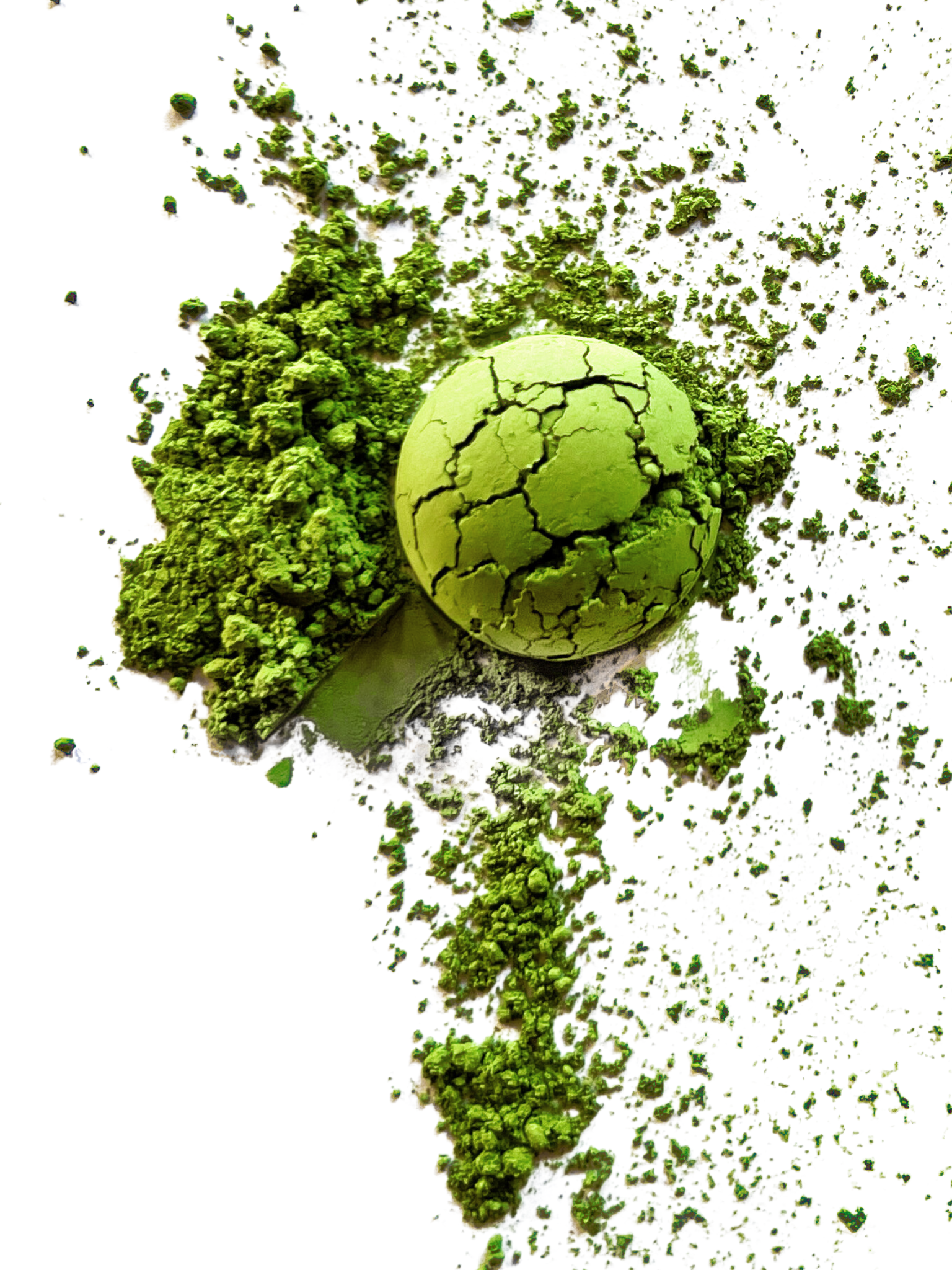
How Long Does Caffeine from Matcha Last?
One of the unique benefits of matcha is the way its caffeine interacts with your body. Unlike the quick spike and subsequent crash often associated with coffee, the caffeine in matcha is released gradually, thanks to the presence of L-theanine. This slower absorption rate means that the energy boost from matcha is more sustained and less likely to result in jitters.
Will Matcha Keep Me Awake?
Yes, matcha can keep you awake, but in a different way than coffee. The combination of caffeine and L-theanine promotes a state of calm alertness, making matcha an ideal choice for those who need to stay focused without feeling overstimulated. This makes matcha particularly beneficial for tasks that require sustained concentration, like studying or working on a project.
Because the energy from matcha is released more evenly, it avoids the sharp peaks and crashes often experienced with coffee. Instead, you get a smoother, more stable source of energy that can last for several hours.
How Long Does Caffeine from Matcha Last?
The effects of matcha caffeine typically last between 4 to 6 hours. This longer duration is due to the slow absorption process, which helps maintain a steady level of energy without the sudden drop-off that coffee drinkers often experience. For most people, this sustained energy is sufficient to carry them through the morning or an afternoon slump.
However, because matcha’s effects are more prolonged, it's important to be mindful of when you consume it, especially later in the day. Drinking matcha too late can interfere with your sleep schedule, which leads us to the next section.
Is Matcha Better Than Coffee for Anxiety?
When it comes to managing anxiety, matcha often has an edge over coffee. While both beverages contain caffeine, the key difference lies in how that caffeine is delivered and its effects on the body.
Coffee, with its high caffeine content, can sometimes exacerbate anxiety by increasing heart rate and causing jitteriness. This sudden spike in energy can make you feel on edge, particularly if you’re prone to anxiety.
Why Matcha May Be a Better Option for Anxiety
Matcha, on the other hand, contains a unique amino acid called L-theanine, which works to counterbalance the stimulating effects of caffeine. L-theanine promotes relaxation without causing drowsiness, creating a calm and focused state of mind. This means that while matcha provides a gentle energy boost, it also helps soothe the nervous system, making it less likely to trigger anxiety.
Studies have shown that L-theanine can increase alpha brain waves, which are associated with a relaxed yet alert mental state. This calming effect makes matcha a suitable option for those who enjoy the benefits of caffeine but are sensitive to its anxiety-inducing side effects. Unlike coffee, which can lead to a jittery crash, matcha offers a smoother, more balanced experience.
Comparing Matcha and Coffee for Anxiety
So, is matcha better than coffee for anxiety? For most people, the answer is yes. The combination of L-theanine and caffeine in matcha creates a more controlled and steady energy flow, reducing the likelihood of anxiety. If you’re someone who struggles with caffeine-related anxiety, switching to matcha could be a game-changer.
Psst... Use the secret code BONSAIBLOG at checkout to
GET A FREE PREMIUM MATCHA
($33 CAD VALUE)
when you purchase any matcha powder or matcha kit
(Limited to 1 per customer)
Is it Okay to Drink Matcha Every Day?
Yes, it is generally safe and even beneficial to drink matcha every day.
Daily consumption of matcha can provide a consistent source of antioxidants, promote sustained energy levels, and contribute to overall well-being.
However, moderation is key. Most experts recommend limiting your intake to one or two servings per day to avoid overconsumption of caffeine.
Daily Matcha: Health Benefits and Considerations
Drinking matcha daily provides a steady source of antioxidants, particularly catechins like EGCG, which are known for their powerful anti-inflammatory and metabolism-boosting properties.
The combination of caffeine and L-theanine in matcha promotes calm alertness, making it an excellent daily beverage for those who need mental clarity without the nervous energy that coffee often brings.
However, as with any caffeinated beverage, moderation is key. While matcha contains less caffeine than coffee, it’s still important to monitor your intake.
Most experts recommend limiting yourself to one to two servings per day, especially if you are sensitive to caffeine or if you consume other caffeinated products throughout the day.
What Time Is Too Late to Drink Matcha?
While matcha’s caffeine content is less intense than that of coffee, it’s still important to be mindful of when you drink it.
As a general rule, it’s best to avoid drinking matcha in the late afternoon or evening, especially if you’re sensitive to caffeine.
The energizing effects of matcha can last for several hours, so enjoying it too late in the day may interfere with your sleep.
If you’re looking for a calming evening ritual, consider switching to a caffeine-free tea or herbal beverage in the evening. This allows you to wind down without disrupting your sleep cycle, while still enjoying the mindfulness that comes with sipping tea.
Potential Downsides of Daily Matcha Consumption
Though matcha is packed with health benefits, excessive consumption can lead to some drawbacks.
Drinking too much matcha can increase your daily caffeine intake to levels that may cause jitteriness, digestive discomfort, or sleep disturbances, especially if consumed late in the day.
Additionally, matcha contains tannins, which in large amounts can interfere with iron absorption, so it’s advisable to balance your intake with a nutrient-rich diet.
In essence, enjoying matcha daily is perfectly fine and even encouraged for most people, as long as it’s consumed mindfully and in moderation. This daily ritual can enhance your well-being, provided it’s balanced with a healthy lifestyle.
Practical Tips for Managing Caffeine Intake with Matcha
If you love matcha but are mindful of your caffeine intake, there are several strategies you can employ to enjoy your favorite green tea without overdoing it.
These tips can help you balance the energy-boosting benefits of matcha with a healthy approach to caffeine consumption.
Adjust Serving Size
One of the easiest ways to manage your caffeine intake is by adjusting the amount of matcha you use. A standard serving of matcha is 1 gram, which contains about 35-70 mg of caffeine. If you’re sensitive to caffeine, consider using half a serving to reduce the amount while still enjoying the taste and benefits.
Time Your Consumption
Drinking matcha in the morning or early afternoon can give you an energy boost when you need it most, without affecting your sleep. Avoid consuming matcha in the late afternoon or evening, as the caffeine can interfere with your ability to wind down for bed.Pair with
Other Beverages
You can balance your caffeine intake by alternating matcha with herbal teas or decaffeinated beverages. This allows you to enjoy the benefits of matcha without consuming too much caffeine in one day.
Stay Hydrated
Since caffeine can be dehydrating, it’s important to drink plenty of water throughout the day. Staying hydrated helps mitigate any potential side effects of caffeine, such as jitters or restlessness.
Conclusion on Matcha's Caffeine Content
Understanding the caffeine content in matcha and how it compares to other beverages can help you make informed decisions about your daily intake. Matcha offers a unique combination of energy and calm, thanks to its balance of caffeine and L-theanine.
Whether you’re choosing matcha over coffee for its steady energy boost, enjoying it as part of a healthy daily routine, or managing your caffeine intake with practical strategies, matcha can be a valuable addition to your lifestyle.
As you explore the benefits of matcha, remember that timing, moderation, and quality are key. By integrating these practices, you can enjoy the full range of matcha’s benefits without compromising your sleep, energy levels, or overall well-being.
GET YOUR CAFFEINE KICK WITH BONSAI CHA
Frequently Asked Questions (FAQ)
1. How much caffeine is in matcha compared to coffee?
Matcha contains about 35-70 mg of caffeine per gram, depending on the quality and preparation. In comparison, an average cup of coffee contains about 95 mg of caffeine. While matcha has less caffeine than coffee, it provides a more balanced, sustained energy due to the presence of L-theanine.
2. Is matcha higher in caffeine than coffee?
No, matcha generally contains less caffeine than coffee. However, the caffeine in matcha is absorbed more slowly by the body, leading to a longer-lasting and smoother energy boost.
3. Is matcha better than coffee for anxiety?
Yes, matcha is often considered better for anxiety because it contains L-theanine, an amino acid that promotes relaxation and reduces the jittery effects of caffeine. This makes matcha a great choice for those who experience anxiety with coffee. Start with 1/2 a gram of matcha and gauge your reaction.
4. Will matcha keep me awake?
Yes, matcha can keep you awake, but in a gentler way than coffee. The combination of caffeine and L-theanine in matcha provides alertness without the sudden energy spikes and crashes, making it ideal for sustained focus and wakefulness.
5. How long does caffeine from matcha last?
The caffeine in matcha typically lasts for about 4-6 hours, providing a steady energy boost. The presence of L-theanine helps to smooth out the effects, leading to a more prolonged and calm alertness compared to coffee.
6. Is it okay to drink matcha every day?
Yes, it’s generally safe to drink matcha every day. Daily matcha consumption can offer health benefits such as antioxidants, improved focus, and sustained energy. However, it's best to limit yourself to one or two servings per day to avoid excessive caffeine intake.
7. What time is too late to drink matcha?
It’s best to avoid drinking matcha in the late afternoon or evening, especially if you’re sensitive to caffeine. Consuming matcha after 3 PM might interfere with your sleep, so enjoy it earlier in the day for optimal benefits.
8. How does matcha’s caffeine content compare to Earl Grey tea?
Matcha generally contains more caffeine than Earl Grey tea. A typical serving of matcha has around 35-70 mg of caffeine, while a cup of Earl Grey tea has about 30-60 mg. However, matcha provides a more sustained energy boost due to its unique composition.
9. What tea has the most caffeine?
Of the common teas, black tea typically has the most caffeine, but matcha is unique because it contains the entire ground tea leaf, resulting in a higher concentration of caffeine compared to regular brewed teas like green or black tea.
The information provided in this article is for informational purposes only and is not a substitute for professional medical advice, diagnosis, or treatment. Always consult your physician or a qualified healthcare provider with any questions about a medical condition. Bonsai Cha products are not intended to diagnose, treat, cure, or prevent any disease. The statements in this article have not been evaluated by the FDA or Health Canada.

